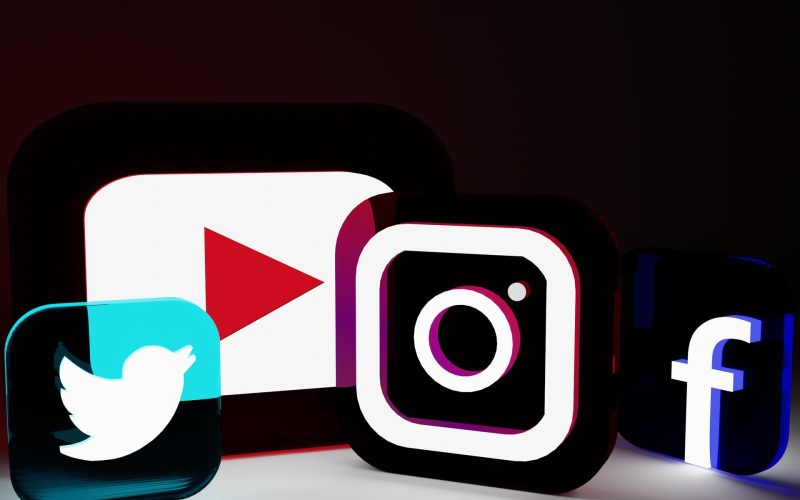Introduction
Social media has changed a lot about how we talk to each other, share ideas, and enjoy music. For the music world, social media has made a huge difference. It has helped artists grow their fanbases, share their songs, and connect with fans in new ways. Platforms like Instagram, TikTok, Twitter, and YouTube have allowed musicians to communicate directly with their audience. This bypasses traditional ways like record labels or radio stations.
In this article, we will look at how social media has changed the music industry. We will focus on marketing, fan interaction, music sharing, and the music business.
How Social Media Changed Music Marketing

In the past, musicians relied on traditional methods to market their music. These methods included radio stations, TV shows, and magazine features. But with social media, artists now have the chance to share their music directly with the public. Platforms like Instagram and TikTok allow musicians to post updates, sneak peeks, and interact with their fans.
TikTok, in particular, has become a powerful tool for music promotion. Many songs go viral through trends or challenges on the platform. Social media also lets artists share their personality and creative process, making their fanbase feel closer to them.
How Social Media Helps Artists Connect with Fans
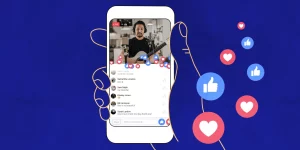
Before social media, musicians had limited ways to communicate with their fans. Today, artists can respond to messages, comment on posts, and share personal moments with their followers. Social media lets fans feel like they are part of the artist’s journey.
On platforms like Instagram and Facebook, artists can host live videos, concerts, or Q&A sessions. This helps them connect with fans on a deeper level. Fans can also provide feedback, which keeps the conversation going and strengthens the bond between artists and their audience.
Influencers and Celebrity Endorsements in Music
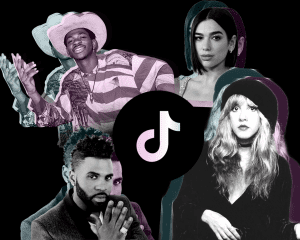
Social media has also changed how artists get their music out to the public. Influencers and celebrities play a big role in promoting songs. Many artists now work with influencers to spread their music to a wider audience.
For example, someone popular on TikTok might create a dance to a song. This causes millions of others to join in and share the video. Celebrities also use their social media to promote songs, helping them reach people around the world. These kinds of endorsements can turn an unknown artist into a hit overnight.
How People Discover Music Now
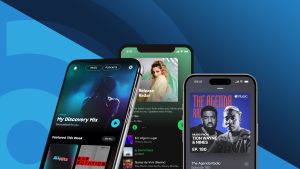
Before social media, music was mostly discovered through radio, music stores, or TV shows. Today, social media has made it easier for people to find new music. Now, music is shared on platforms like Spotify, YouTube, and SoundCloud. These platforms suggest new songs based on what users already like.
Social media also helps with music discovery. Fans share their favorite songs and playlists online, which can help unknown music go viral. This has made it much easier for people to discover new artists and songs they might never have heard before.
Making Money in the Music Industry with Social Media

Social media has also opened up new ways for artists to make money. While musicians still earn money from album sales and live performances, social media offers more ways to earn. Platforms like YouTube allow artists to make money from ads, while Instagram and TikTok let artists work with brands for paid promotions.
Social media trends can also boost song sales. For example, if a song goes viral on TikTok, it can lead to more streams and downloads. Artists can also use crowdfunding platforms like Patreon to get support directly from their fans. This helps independent musicians earn money without relying on big record labels.
Problems and Risks of Social Media for Artists
While social media offers many benefits, it also comes with problems. One major issue is that artists are under pressure to stay active online. They need to post often to keep their fans interested, which can be tiring and cause stress.
Another issue is that there is so much content online that it’s hard for any artist to stand out. With millions of videos, songs, and posts, it can be difficult for musicians to get the attention they deserve. Also, social media algorithms often prefer certain types of content, which can make it even harder for some artists to get noticed.
How Social Media Changed Traditional Music Business Models
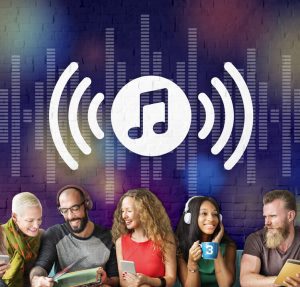
Social media has also affected traditional music business models. In the past, artists depended on record labels and big media companies to promote their music. Today, social media lets artists promote their own music directly to their fans.
Streaming platforms like Spotify and Apple Music have also changed the way people listen to music. More people now stream music online, and fewer people buy CDs or vinyl records. While this has hurt album sales, it has created new ways for artists to earn money through streaming services and brand deals.
Social Media Influencers and Music Promotion
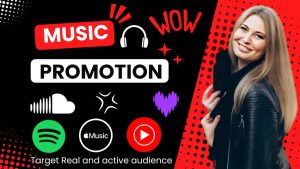
Social media influencers have become important partners for promoting music. Influencers have large followings on platforms like Instagram, TikTok, and YouTube, and they use their platforms to recommend songs to their fans. When an influencer shares a song or creates content around it, their fans often follow suit, helping the song gain popularity.
For example, a TikTok influencer might create a viral dance challenge using a song, which can lead to more people streaming the track. This type of promotion can help songs go viral quickly and reach new audiences. For artists, working with influencers is a smart way to get their music heard by more people, especially those in younger demographics.
Music Discovery through Social Media

Social media has changed the way people discover new music. In the past, people often relied on radio stations, TV shows, or friends to find new songs. Today, social media platforms like Spotify, TikTok, and YouTube suggest new music based on users’ preferences and what’s trending. These recommendations help listeners discover new artists and songs that they might not have heard otherwise.
For artists, this means they have more opportunities to be discovered. They don’t need to wait for a radio station or record label to give them a chance. By sharing their music on social media and using the right hashtags or engaging with followers, independent musicians can reach a much larger audience.
Social Media and Music Industry Revenue
Social media also plays a significant role in generating revenue for the music industry. Artists and record labels can use platforms to sell music directly to their fans. Platforms like Instagram, Facebook, and Twitter allow artists to share links to streaming services where fans can purchase or stream their songs. This helps artists earn money from their music without needing a middleman.
In addition to direct music sales, artists can earn money through brand partnerships and sponsored posts on social media. Many musicians collaborate with brands to promote products, using their social media accounts to advertise these partnerships. This creates another revenue stream for artists, which has become increasingly important as traditional music sales have declined.
The Impact of Social Media on Music Fans’ Behavior
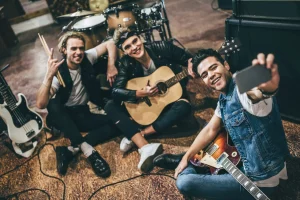
Social media has changed how music fans behave and interact with artists. Fans are no longer just listeners; they have become active participants in the music world. Fans share their favorite songs, create content around them, and promote artists by tagging them in their posts. In this way, fans help spread music organically, without the need for expensive advertising.
Fans also use social media to show support for artists they love. Whether it’s through attending virtual concerts, buying merchandise, or posting about a new release, social media has given fans a platform to express their loyalty. This level of interaction creates a strong community around artists and their music, which can boost the artist’s career.
Social Media as a Source of Inspiration for Artists
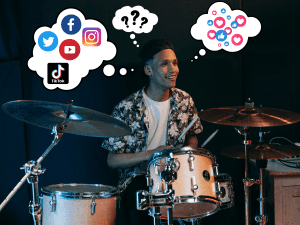
For many artists, social media is a source of inspiration. They use platforms like Instagram and Twitter to connect with fans, share their ideas, and get feedback on their work. Social media allows artists to see what their followers like and dislike, helping them improve their music and stay in touch with their audience’s preferences.
Moreover, many artists are inspired by the creativity they see on social media. From fan-made videos to memes and artwork, social media allows artists to see how their music is being interpreted and enjoyed by their fans. This connection can fuel their creativity and lead to even more unique and meaningful music.
The Future of Social Media in the Music Industry
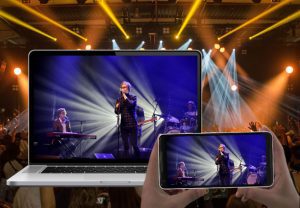
Looking ahead, it’s clear that social media will continue to play a major role in the music industry. New platforms and technologies are always emerging, and artists will continue to find innovative ways to engage with their fans online. Virtual concerts, live streams, and music challenges will likely become even more popular as technology advances.
As social media becomes more integrated with other technologies like augmented reality (AR) and virtual reality (VR), the way we experience music may change even further. Artists may use these technologies to create immersive experiences that fans can enjoy from anywhere in the world. Social media will remain a powerful tool for musicians to promote their work and connect with their audience in exciting new ways.
Analysis Table:
| Aspect | Traditional Music Industry | Social Media Influence in Music Industry |
|---|---|---|
| Music Discovery | Radio, TV, Word of Mouth | Algorithms, Social Sharing, Platforms |
| Artist Promotion | Record Labels, TV, Press | Social Media Channels, Direct Fan Engagement |
| Fan Engagement | Limited, through events, media | Direct, through live streams, social interaction |
| Revenue Generation | Album Sales, Concerts, Merch | Streaming, Sponsorships, Crowdfunding, Merchandise |
| Music Accessibility | Limited to distribution channels | Instant, Global Access via Platforms |
| Influencer Impact | Limited | Major, Influencers play key role in song virality |
Comparative Table:
| Factor | Pre-Social Media Era | Post-Social Media Era |
|---|---|---|
| Artist Reach | Limited to radio, TV, and press | Global, Direct access to fanbases via platforms |
| Music Discovery | Radio, Music Stores | Streaming Platforms, TikTok, Instagram |
| Monetization | Album Sales, Concert Revenue | Streaming Royalties, Brand Partnerships, Crowdfunding |
| Fan Interaction | Mostly via Concerts, Interviews | Real-time engagement via social media posts and live-streams |
| Music Promotion | Record Label Centric | Self-Promotion, Influencer and Fan-Driven |
Conclusion: What’s Next for Social Media and Music?
Social media has had a big impact on the music industry. It has changed the way artists promote their music, engage with their fans, and earn money. While there are some challenges, social media provides new opportunities for musicians, especially independent ones.
As technology keeps improving, social media will continue to shape the future of the music industry. New platforms and tools will keep changing how artists and fans interact, making the music experience even more exciting.






